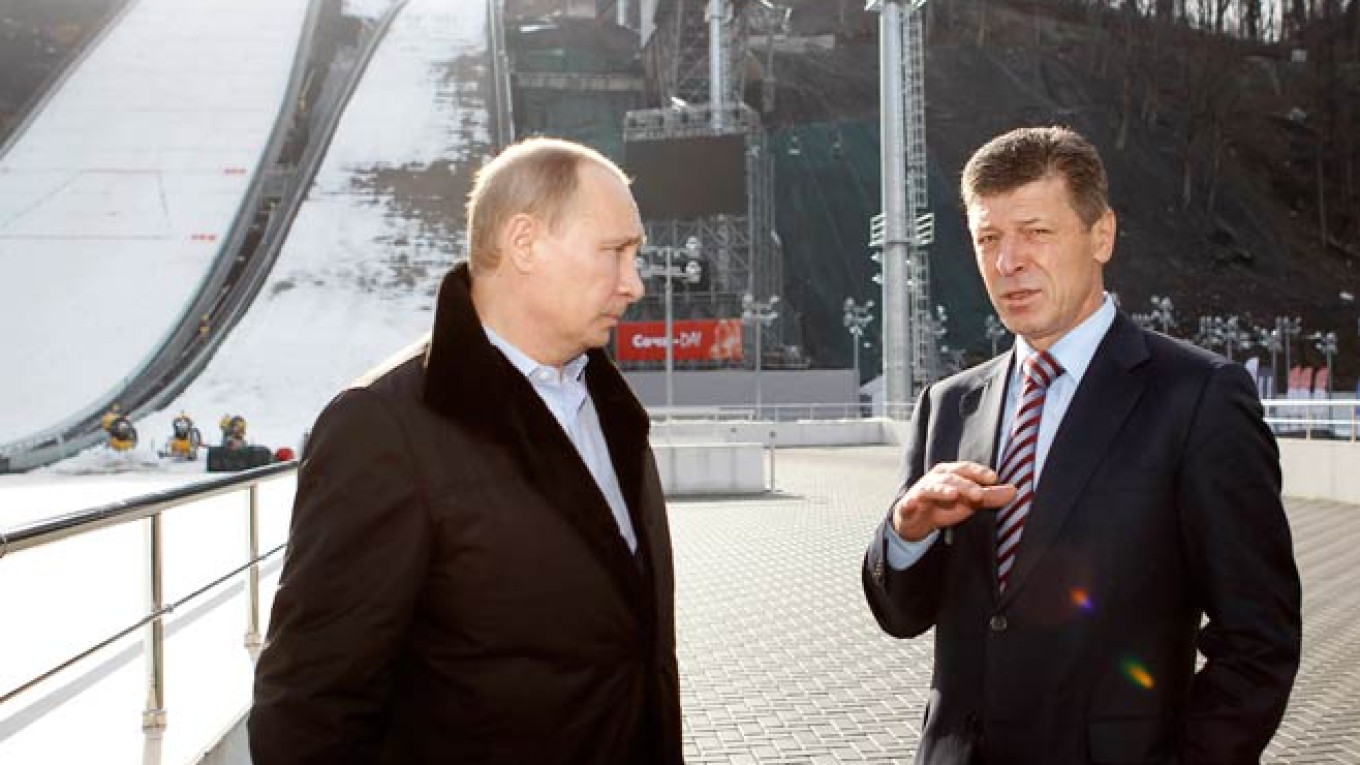The U.S. on Monday expanded its blacklist of Russian officials and companies to face sanctions over Moscow’s “illegitimate and unlawful actions” in Ukraine, adding more members of President Vladimir Putin’s inner circle in a clear attempt to hit the Russian president where it hurts.
The European Union and Canada were also gearing up to impose their own sanctions, with the EU set to release a list of 15 more names on Tuesday and Canada announcing it had already sanctioned two Russian banks and nine individuals on Monday.
The U.S. Department of the Treasury’s official statement on the list made no secret of the fact that it was aimed at Putin’s closest allies.
Seven officials, including head of state oil company Rosneft Igor Sechin, Deputy Prime Minister Dmitry Kozak, head of state technology corporation Rostec Sergei Chemezov and Deputy Head of the Presidential Administration Vyacheslav Volodin were banned from traveling to the U.S. and their assets there were frozen.
Sechin was included because, as the Department of the Treasury’s statement said, “Sechin has shown utter loyalty to Vladimir Putin — a key component to his current standing.”
President Barack Obama said that while he was not trying to target Putin personally, he was hoping to “change his calculus with respect to how the current actions that he is engaging in could have an adverse impact on the Russian economy over the long haul.”
Ahead of the list's publication, Russia's major business daily Kommersant reported, quoting unidentified officials in the U.S. administration, that head of Gazprom Alexei Miller would be on the list, though he was not.
This is the third wave of sanctions aimed at Putin's closest allies and their companies, with the U.S. saying that there was strong evidence that Russia was not only encouraging the activities in eastern Ukraine but also refusing to take steps to resolve the situation. ?
But while 17 companies, including Volga Group, Transoil and SMP Bank, owned by businessmen including Arkady and Boris Rotenberg, Gennady Timchenko and Yuri Kovalchuk — believed to be Putin's personal friends —? were added to the blacklist, analysts said the sanctions were unlikely to do much damage to Russia's economy and business.
By Monday evening, however, the news had already made a dent in Russian business: Rosneft shares lost 1.5 percent and the ruble was down against the dollar.
Obama also warned that sanctions against Russia's energy and defense sectors were still on the table and that they would be used if Russia continued to escalate the situation in Ukraine.
“We are keeping in reserve additional steps that we could take should the situation escalate further,” Obama said.
Russia hit back at the U.S. with a strongly worded statement from the Foreign Ministry.
"We are disgusted with the statement issued by the White House press secretary," said Deputy Foreign Minister Sergei Ryabkov.
"Every word used by the White House press secretary in the statement confirms that the U.S. has completely lost touch with reality and is leading things toward an escalation of the crisis," Ryabkov said.
Analysts expressed doubt about the new sanctions' effectiveness, saying the U.S. was likely still seeking dialogue. ?
“The new blacklist is a relatively light variant of sanctions against Russia, it is not a massive blow against Russia's financial or energy sectors, but is a symbolic measure,”? Vladimir Slatinov, a political analyst with the Institute for Humanitarian and Political Research, said by phone.
“The blacklist demonstrates that Obama wants to show that the U.S. is going to make its measures harsher but still leaves a space for dialogue with Russia at the same time,” he said.
Both Sechin's Rosneft and Chemezov's Rostec have joint projects with American companies.? Rosneft has a major partnership with the U.S. ExxonMobile for the development of the Arctic shelf, while Rostec's subsidiary VSMPO-Avisma is the main supplier of titanium for the U.S. aircraft maker Boeing. Just prior to the announcement of sanctions, Rosneft approved the development of two oil fields jointly with ExxonMobil on the Arctic shelf. ?
The sanctions have yet to deal with Russia's energy sector directly, and it is a target that the Western decision-makers are likely to leave for last, said Lilit Gevorgyan, a senior economist at IHS Global Insight, a U.S.-based international consultancy, adding that Western companies were unlikely to exit Russia's energy sector any time soon.
“But there is certainly a gradual encroachment on the energy territory, one of the symbolic steps being the inclusion of Sechin, Putin's long-standing ally and a very important energy sector leader, in the sanctions list,” Gevorgyan said.
Sechin seemed to shrug off the news of his inclusion on the blacklist, saying Rosneft was going to continue cooperation with its U.S. partners and that he saw the sanctions as a “a high mark for the company's effective work,” Interfax reported.
Related article:
U.S. Threatens New Sanctions Will Target Putin's Inner Circle
Contact the authors at e.kravtsova@imedia.ru and a.panin@imedia.ru
A Message from The Moscow Times:
Dear readers,
We are facing unprecedented challenges. Russia's Prosecutor General's Office has designated The Moscow Times as an "undesirable" organization, criminalizing our work and putting our staff at risk of prosecution. This follows our earlier unjust labeling as a "foreign agent."
These actions are direct attempts to silence independent journalism in Russia. The authorities claim our work "discredits the decisions of the Russian leadership." We see things differently: we strive to provide accurate, unbiased reporting on Russia.
We, the journalists of The Moscow Times, refuse to be silenced. But to continue our work, we need your help.
Your support, no matter how small, makes a world of difference. If you can, please support us monthly starting from just $2. It's quick to set up, and every contribution makes a significant impact.
By supporting The Moscow Times, you're defending open, independent journalism in the face of repression. Thank you for standing with us.
Remind me later.


